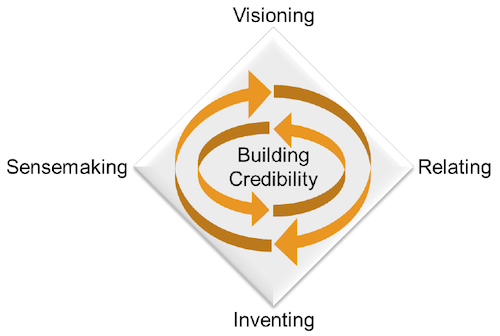Decades of research by Deborah Ancona and her colleagues Thomas Malone, Wanda Orlikowski, and Peter Senge (all MIT faculty) have uncovered the four key capabilities of effective leaders—sensemaking, visioning, relating, and inventing. However, “no matter how exceptional, it is truly rare to see a leader exhibit more than two or three of these capabilities,” says Ancona. “Effective leaders know what their strong suit is and do not fall for the myth of the omniscient leader.”
Known previously as the “4-CAP model,” this leadership framework has recently been updated to add “building credibility” to its center. Renamed “4-CAP +” accordingly, this revised model demonstrates the importance of gaining respect from others by keeping commitments, creating trust with subordinates, and operating with a strong sense of purpose.
"What do you need to do to be a great leader? Do what you say you’re going to do"
Know your strengths
The key capabilities of effective leaders span a wide-ranging set of skills–from the intellectual and interpersonal to the conceptual and creative–required in today’s business environment. Do you know what your key strengths are?
Sensemaking: Are you open to new trends and information? Can you create order from uncertainty? Do you experiment to learn how the organization will respond? Effective leaders are keenly aware of what is going on in this chaotic world and realize that new, better methods may come from outsiders. “To some extent, sensemaking is the opposite of tunnel vision,” says Ancona. “Satya Nadella, the CEO of Microsoft and an exceptionally voracious reader and participant in online courses, is a great example of a leader gifted with sensemaking.”
Relating: Are you attuned to other people’s feelings and assumptions? Are you expert at influencing and negotiating? Relating is about developing supportive relationships and bringing people together, both within and outside an organization. This starts with a strong ability to listen to others and understand what makes them tick. Only then can these leaders rally support for their own ideas. Eileen Fisher, founder of the eponymous women’s clothing brand, is an effective and persuasive leader who has recognized the need to involve others to achieve transformation.
Visioning: Do you enjoy developing a vision about things that inspire you? Are you good at creating a vision that uplifts others? If so, you may be a master of visioning. Effective leaders are also able to link their vision to an organization’s core values and mission, imparting optimism in the process. Richard Branson of the Virgin Group is known for exciting people with his visionary new ideas for businesses and the technologies that will get us there. Branson also believes in hiring for his weaknesses.
Inventing: Are you a truly creative yet practical person? Do you like exploring alternative ways of doing things? Are you a logistics expert who always knows how to get things done? Inventing is about devising ways to bring a vision to life, either through structures or processes. As the ones who “keep the trains running,” they are not afraid of making tough decisions when reality demands it. At the same time, such leaders create a culture of learning so that both innovation and execution occur. Henry Ford is known as a technological and industrial innovator, but his creativity extended to his ability to decisions.
Building credibility is at the core of effective leadership
In the 4-CAP+ model to which Ancona refers in her courses and article, building credibility appears at its center, surrounded by arrows. This is because it is both the condition and the result of the other four. Your ability to act with integrity requires gaining respect from others by keeping commitments and operating with a strong sense of purpose. “Credible leaders walk the talk. Their actions match their words,” says Ancona.

Ancona acknowledges that leaders may question the value of integrity or distributed leadership when they see examples of people who cheat and lie and get ahead in the world. In a recent post by Senior Associate Dean of Executive Education Dr. Peter Hirst, Ancona’s response to those who challenge the need for integrity in leadership is two-fold.
“First, the attractiveness of narcissistic leaders is short lived and can cause good people to leave companies where toxic leadership is the norm … and when people start to see that these leaders are only interested in getting ahead,” she cautions. “It is better to focus on vision and solving tough problems, not on ego enhancement. And often that vision is about creating a new future; a future where things are better than they are now. Do you want to be a leader, or do you want to get ahead? Sometimes these go together, but sometimes it takes courage to just do the right thing.”
Ancona’s Executive Education program, Transforming Your Leadership Strategy, is your opportunity to explore this fundamental approach to leadership development at MIT. Engage with feedback and discovery tools to understand the unique strengths, experiences, and values that define your own leadership signature as well as identify areas for further development. We invite you to learn more about this two-day course.








